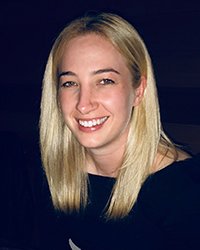Developmental and Clinical Student Wins Prestigious NSF Fellowship
 |
| Lily Durwood |
The National Science Foundation's Graduate Research Fellowship Program (GRFP) is highly competitive and provides fellowship support for graduate students (master or doctoral) in science, technology, engineering, and mathematics. Recipients are given a three-year award consisting of a fellowship stipend and an education allowance, in addition to the powerful networking opportunities and resources afforded by being selected as a fellow.
The Department of Psychology is fortunate to have several NSF fellows in our graduate program. Lily Durwood, a second year student in Child Clinical with Drs. Kristina Olson and Kate McLaughlin, is our most recent recipient of this prestigious fellowship.
Where are you from and where did you complete your undergrad?
I grew up in San Diego, California, and I completed my undergrad at Harvard in Psychology with a minor in Studies of Women, Gender, and Sexuality.
How did you wind up at UW?
I’ve been in Seattle since 2010. I moved here right after college when I got a job working in HR at Microsoft. After five years at Microsoft, I decided I wanted to return to Psychology, so I came to UW first as a staff member in two labs and then as a graduate student in 2016. I applied to UW because the clinical training is incredible here and because UW is the home of a huge longitudinal study, the TransYouth Project, that is focused on the population that I am interested in, transgender kids. I also really wanted to work with my two advisors, Drs. Kristina Olson and Kate McLaughlin.
What is your research interest and how did you get into it?
I’m interested in figuring out what families should do when they have a young child who may identify as transgender. I became interested in the topic when I was in college and I saw an episode of 20/20 about a transgender child and subsequently learned how little research exists to support families in this situation.
The name of my NSF-funded project is Concealing an Identity in Hostile vs. Accepting Environments.
How might your research change the world?
Well, I’m not sure if my research will change the ENTIRE world, but I think it will have large implications for a small group of people. Like I said, I’m interested in figuring out what families should do when they have a young child who might identify as transgender. Right now, these families have very little research that can inform a host of decisions they face on how to best support their child (e.g., Should they let their child live as transgender? Does that decision depend on how accepting vs. hostile their child’s social environment is? If the child lives as transgender, should he or she be open about that at school, with friends, etc., or will that be harmful because it will expose them to more bullying and discrimination, etc.? And so on.).
Do you have any advice/tips/suggestions for others who may apply to this opportunity? About graduate study in general?
It was helpful for me to start thinking about my research idea very early (maybe 6 months before the application was due), and I also got feedback from my advisors on the idea very early on as well. That gave me the chance to work on the proposal in a leisurely(ish) way throughout the summer, and I had time to think between drafts. When I applied two years ago and didn’t get the award, I started working on a proposal 24/7 about six weeks before it was due. I think giving myself more lead time and working on it little-by-little was a better strategy for me. On the other hand, my friend Trent has an NSF also and I think he wrote his in a month or two—so maybe it depends on the person.
If you plan to apply for an NSF, I’d recommend reaching out to someone who has applied for one before and is willing to share their materials with you (feel free to email me!). Whether or not you receive the grant, the reviewers give you feedback on your application, and it’s very helpful to read about the kinds of things that reviewers care about. For example, I know from many comments I’ve read that reviewers care a lot about the broader impacts of your research.
What do you hope to accomplish with this funding?
The NSF will give me a lot more time to devote to answering the research questions I mentioned before. To do that, I’ll be flying around the country a lot with other members of my lab to meet with families in our study, and then I’ll be writing up the results, of course! In terms of clinical training, one big goal of mine is to figure out how to explain the research that currently exists in the field to families in a way that makes sense.
Supplemental Reading:
- Several graduate students have been featured in past issues for their NSF awards, Trent DesChamps, Linda Zou, Kelsey McCune, Arianne Eason, Laura Brady, Teri Kirby, and Bjorn Hubert-Wallander.
- More information on the GRFP can be found online.
- Assistance in applying to the NSF is provided by the UW Graduate School Fellowships and Assistantships Office.
- Grants and Funding Information Service (GFIS) through the UW Libraries.